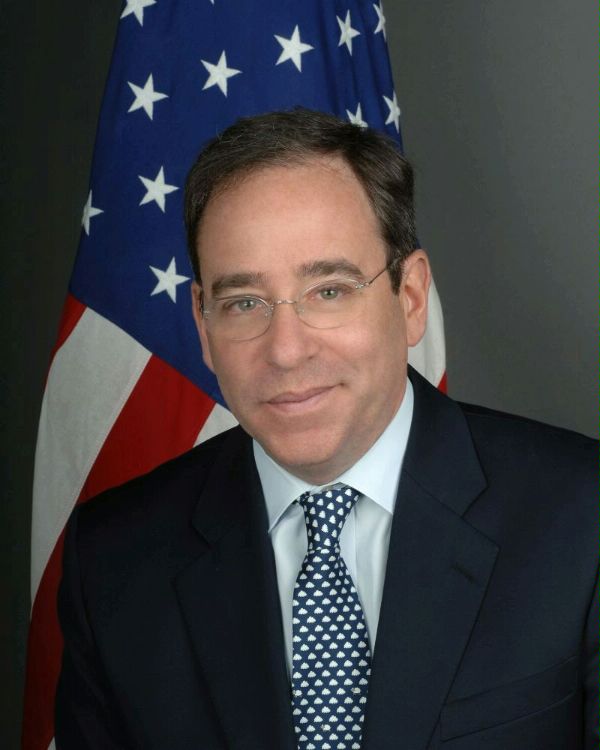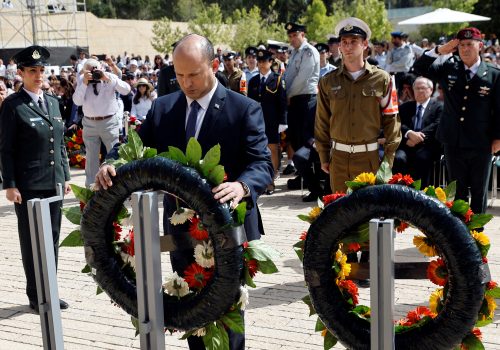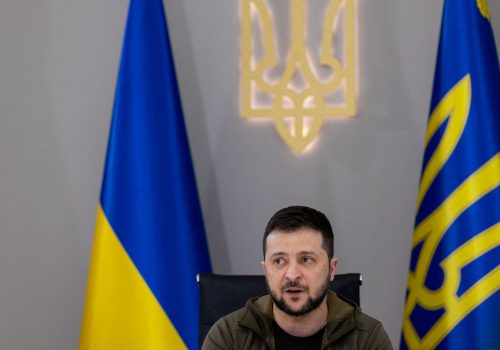Building a New Middle East – A Conversation with US Ambassador to Israel Thomas R. Nides
On May 3, 2022, the Middle East Programs hosted US Ambassador to Israel Thomas R. Nides for a conversation with the Atlantic Council’s Distinguished Fellow and one of Ambassador Nides’ predecessors, Ambassador Daniel Shapiro. This event was introduced by Oren Eisner, president of the Jeffery M. Talpins Foundation, the Atlantic Council’s leading partner in its work on Israel and its N7 initiative for advancing normalization between Israel and its Arab neighbors.
Kicking off the conversation, Ambassador Shapiro noted that he joined the Atlantic Council to continue his work to expand normalization efforts, a goal that they both share, as a lead-in to his first question: Why are the Abraham Accords a priority for the United States, and how is the Biden Administration working to advance them? Referencing his confirmation hearing, Ambassador Nides maintained that his response still holds true: he and the administration respect the Abraham Accords, and his biggest personal priority is strengthening a democratic Jewish state. Crediting the Trump Administration for creating the momentum to begin these efforts, Ambassador Nides explained that his work focuses specifically on deepening relations with normalized countries, while the White House is responsible for broadening the scope of the Accords.
The significance of the Abraham Accords is that they aid Israel in remaining a secure, democratic state while also making the entire region more secure, both economically and politically. Ambassador Nides asserted that the Abraham Accords are a largely bipartisan effort. Since his confirmation, many US government officials have met with him to express their support for the expansion of normalization in the region. Further, he contended that people-to-people understanding is the most important value that the Accords bring to the region, and key sectors such as technology, healthcare, sports, and tourism are ripe avenues for increased people-to-people understanding. Tourism between Israel and the UAE is increasing dramatically, with similar efforts underway to grow tourism with Bahrain and Morocco. Ambassador Nides underscored the strong potential of such cross-country engagement, especially among younger generations, to change local narratives around normalization and solidify the accomplishments of the Accords far into the future.
When asked about the Biden Administration’s strategy for broadening the Accords, Ambassador Nides described the US as a matchmaker. He emphasized the administration’s belief in the importance of displaying the benefits of the Accords to the surrounding countries through economic and people-to-people successes, and in a follow-up question on how to make the case of the Accords’ benefits for Palestinians, Ambassador Nides doubled down on this approach. When the Biden Administration came into office, they pledged $450 million in assistance for education, healthcare, and other services in Palestinian communities. The administration remains committed to a two-state solution and sustaining a strong democratic Jewish state. To do this through regional cooperation, it is imperative that the Palestinians are involved.
Speaking on the confluence of Passover, Easter, and Ramadan, and rising tensions in Jerusalem, Ambassador Nides gave the Israeli government a lot of credit for their efforts to defuse tensions and maintain peace during an important time for all three Abrahamic religions. He spent a lot of time with Israel’s defense and internal security ministers, working to keep the conflict to a minimum. He applauded their work, as there were over 250,000 Muslim worshippers at the al-Aqsa mosque on April 28.
When asked about the stability of Israel’s government following the withdrawal from the coalition of a member of Prime Minister Bennett’s party and the potential ramifications of another political transition on the Abraham Accords, Ambassador Nides remained confident in the Accords’ sustainability. He emphasized that the normalization process remains a key priority for many, especially within the Biden Administration. Moreover, the US maintains a strong working relationship with Prime Minister Bennett and the Israeli government as a whole, which is important when considering other elements of conflict in the region requiring common ground between the two countries.
Ambassador Nides offered an honest assessment when asked about the ongoing deadlock in JCPOA negotiations and US engagement with Israel on Iran. Regardless of whether the JCPOA is renewed, the administration is committed to ensuring Iran can never acquire a nuclear weapon and believes a diplomatic approach remains the best course of action. Normalizing countries share this stance, and the Abraham Accords have the unique ability to make these countries safer in relation to Iran by increasing their cooperation against shared threats.
Continuing the discussion of Israel’s foreign policy, Ambassador Shapiro also raised the issue of Israel’s response to the crisis in Ukraine and its alignment with US policy. Ambassador Nides asserted that communication between the Israeli government and the White House has been constant throughout the crisis. Furthermore, Israel continues to provide needed humanitarian assistance, opening a field hospital in Mostyska, and has accepted tens of thousands of Ukrainian refugees.
Addressing the role of the US in the Middle East and its commitment to the region, Ambassador Nides highlighted that no country in the Middle East does not value a relationship with the US, whether through hard or soft power. The Biden Administration, in particular, knows a great deal about the region, and the Ambassador is confident that the administration is fully engaged in the Middle East.
Finally, when asked to reflect on Israel’s history on the eve of their Memorial and Independence Days, Ambassador Nides reminded the audience that Israel is only 74 years old, during which time it has become a military superpower, an economic powerhouse, and a thriving democracy. Though Israel faces many conflicts, what makes this country stronger is its will to fight and work to make it a better place for all.
Salwa Balla, is a Young Global Professional with the Rafik Hariri and Middle East Programs.
Further reading
Thu, Apr 28, 2022
Israel’s PM gave a Holocaust Remembrance speech without mentioning Iran. It signals a new approach.
MENASource By Daniel B. Shapiro
Naftali Bennett signals confidence that Israel will be vigilant and strong. That confidence grows out of more than just a different philosophical approach.
Wed, Apr 13, 2022
Israel won’t stick out its neck for Ukraine. It’s because of Russia.
MENASource By David Daoud
Over the last decade, regional developments have forced Israel to balance its moral sense regarding the Russia-Ukraine conflict against its vital national interests.
Wed, Apr 6, 2022
Zelenskyy wants Ukraine to be ‘a big Israel.’ Here’s a road map.
New Atlanticist By Daniel B. Shapiro
By adapting their mindset to mirror aspects of Israel’s approach to security challenges, Ukrainian officials can tackle their own critical challenges with confidence.



